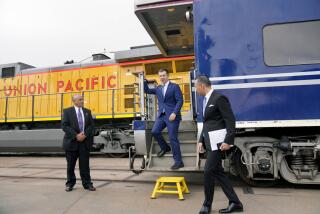Los Angeles-to-Texas Venture : Port Oil Pipeline Project Talks Open
Pacific Texas Pipeline Co. of Long Beach has entered negotiations with Sumitomo Bank of California to finance a 1,026-mile, $1.6-billion pipeline that would transport crude oil from the Port of Los Angeles to Texas.
Yoshio Okkotsu, assistant vice president for the firm’s international banking branch in Los Angeles, said the bank could sign an agreement with the firm by next summer. The bank would act as the lead bank among an unspecified number of financial institutions, he said.
However, Okkotsu said the ultimate success of the negotiations depends on Pacific Texas’ meeting “certain conditions.” Although he declined to list the conditions, Okkotsu said they do include the company’s being able to obtain the necessary state and federal permits for construction of the project.
Pacific Texas announced in 1982 that it planned to build the pipeline project, picking up where Standard Oil of Ohio left off three years earlier. That firm abandoned plans for a similar project after a bitter, four-year battle with government agencies concerned about the effects of such a project on the environment.
Pacific Texas had said it would seek approval to construct the project at the Port of Long Beach. However, officials at that port refused to approve Pacific Texas’ application until the firm provided the port with details on how the project would be financed and which oil companies had expressed an interest in using it.
But last month, Los Angeles Harbor Department officials announced they had accepted Pacific Texas’ application to build the project. The port, by approving the application, will work to secure the necessary permits and assume responsibility for the project under provisions of the California Environmental Quality Act.
Pacific Texas President Cecil Owens denied statements by Port of Long Beach officials, including Jim McJunkin, the port’s executive director, that his company had refused to supply the port with details. Owens said he had mailed a letter to the port in October offering to meet with them to discuss the project. The port never acknowledged his letter, he said.
Owens declined to disclose which oil companies might use the pipeline, saying only that the firm had held discussions with a number of firms and was confident it could obtain use agreements. “We would not proceed unless we were very comfortable,” he said.
Owens said the firm plans to begin construction on the project by next summer. The pipeline, which would stretch across California, Arizona, New Mexico and Texas, could be completed by early 1987 and would transport both Alaskan North Slope and California crude oil, he said.
Plans call for an oil terminal on a yet-to-be-built 10-acre landfill island in the Port of Los Angeles’ outer harbor. Oil unloaded from supertankers would be piped to a tank storage farm in Carson and then piped to Midland, Tex., where it would be transported farther east through existing pipelines.
Los Angeles port, as well as Pacific Texas officials, have said the terminal and pipeline, which would be capable of handling 900,000 barrels of crude oil a day, or the equivalent of 34 tankers a month, could cut the delivery time for California and Alaskan crude oil by as much as eight days. At present, the oil must be shipped through the Panama Canal.
Los Angeles Harbor Department officials said the project could create as many as 1,100 construction jobs, and the port could earn more than $15 million in annual revenues.
More to Read
Inside the business of entertainment
The Wide Shot brings you news, analysis and insights on everything from streaming wars to production — and what it all means for the future.
You may occasionally receive promotional content from the Los Angeles Times.










